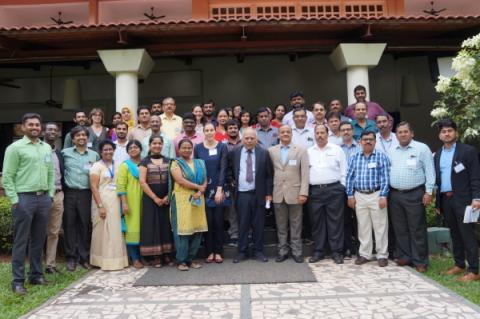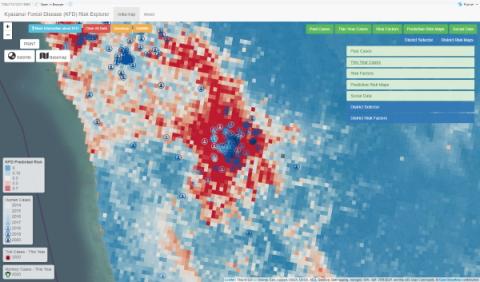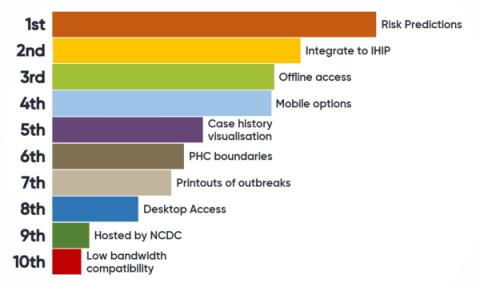Dr Bethan Purse and Dr Juliette Young provide an update on the Knowledge Integration workshop, where stakeholders provided the project team with vital feedback and knowledge to improve the MonkeyFeverRisk Decision Support Tool.
In December, we held the second stakeholder workshop of the MonkeyFeverRisk project, a research project, funded by a Foundation Award from the Global Challenges Research Fund of the MRC, AHRC, BBSRC, ESRC and NERC, to understand how and why the deadly Kyasanur Forest Disease (KFD) is spreading in forest ecosystems in India.
Our “Knowledge Integration” workshop brought together key state and district level disease managers and policy makers, from KFD-affected areas of Karnataka, Maharashtra and Kerala, from the public health (22 participants), animal health (six participants) and other sectors (six from agriculture, forestry and social welfare sectors).

This workshop built on the first framing workshop, by further integrating knowledge from stakeholders into the project Decision Support tools and risk guidance. A prototype Decision Support Tool (DST) was presented to stakeholders to gain their insights into the potential management uses of the tool and improvements required (Figure 2). Some initial findings from the models and field surveys were presented as posters that can be accessed here.
Stakeholders felt that the desk-based App presented would be suitable for officials involved in KFD management from block level up to National and State Levels. For users that may be entering data on case locations and history in remote locations, such as health workers and Primary Health Centre Medical officers, a Mobile Phone App was felt to be more suitable. Key management uses identified for the tool were to enable targeting of field management activities such as community engagement on preventative measures, tick control and monkey death reporting. The function of raising awareness and providing information on KFD symptoms, risks from ticks, tick prevention measures, post-mortem protocols was also felt to be very beneficial at the ground-level.

Stakeholders further suggested that information from the DST could help with resource planning and with media engagement and mobilization of local elected representatives at Taluka and District levels and could feed into multi-level inter-sectoral meetings. The risk maps that predict where human cases of KFD are likely to occur (based on whether locations have similar landscape conditions to locations that had KFD in the past), such as that shown for Shivamogga in the map above, was one of the most popular functional aspect of the DST amongst stakeholders – we used an interactive software to poll participants during the workshop – see Figure 2 below.

Participants to the workshop stressed that preparedness for KFD could be enhanced if updated risk and outbreak maps could be provided each year, in time to guide pre-season tick surveillance, vaccination campaigns and awareness raising amongst Primary Health Centres of KFD risk and diagnosis.
The full report on the workshop and next steps can be found here. The desk-based Shiny App will be rolled out to end-users across sectors by Spring 2020 for piloting whilst translation funding is being sought for the phone app version.
If you are a stakeholder or researcher in One Health or zoonotic disease and would like to join our One Health network or find out a bit more information about accessing and engaging with the Decision Support Tool or with the wider project, please don’t hesitate to get in touch with us by email on beth@ceh.ac.uk (Dr Beth Purse, CEH), slhoti@yahoo.com (Dr Hoti, NITM), darshan.bio@gmail.com (Dr Darshan Naryan, VDL), or on twitter @MonkeyFever_ .
